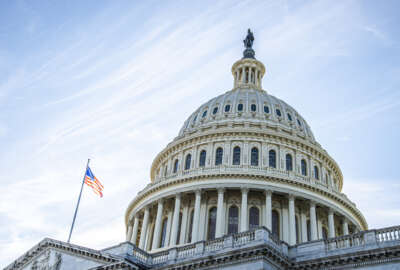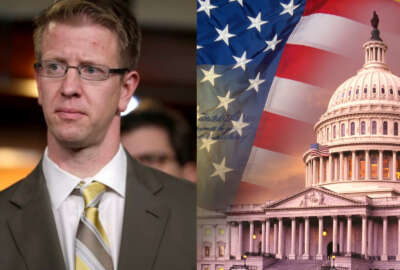OMB anticipates challenges in returning from shutdown
The Office of Management and Budget is anticipating agencies will face some logistical challenges in reopening the government after a 16-day partial shutdown. But...
wfedstaff | April 17, 2015 5:40 pm
The Office of Management and Budget is anticipating agencies will face some logistical challenges in reopening the government after a 16-day partial shutdown.
But Brian Deese, OMB’s deputy director, said federal employees are eager to get back to work and to begin tackling those challenges.
“I think for all employees and certainly us at OMB, those types of challenges — of getting the government reopened — are high-cost challenges compared to the types of things we were dealing with in [the] shutdown, and so I think we’re all motivated to try to work through them,” Deese said in an interview on In Depth with Francis Rose. “It’ll take a little bit of time, as it would in any kind of circumstance, to open a big government like ours. But, I think folks are very motivated, happy to be back and happy to get back into getting through those challenges.”
Many of the challenges facing agencies are technical in nature.

“When you’re down for 2 1/2 weeks, there are issues with IT and getting people’s systems back up online,” Deese said.
In many cases, employees are also going to have to dig out their email inboxes from two weeks of unchecked messages. Feds who were furloughed during the shutdown were generally barred from checking their work email accounts during that time.
“Our government and the way that it works is not designed to shut down,” Deese said. “And, so, no matter how diligently the teams that remained at work to try to protect life and safety — no matter how diligently they did their work — things break down and services are interrupted. And that has real impact.”
Deese said he’s also anticipating congressional hearings on the impact of the shutdown and how agencies prepared for it in the next few weeks.
In fact, House members called the head of the National Park Service to testify about his agency’s shutdown procedures — including placing barricades around open-air memorials, such as the World War II Memorial — while the shutdown was still ongoing.
Budget negotiations to center on sequestration
Federal employees’ relief to be back on the job and getting paid is tempered by the fact that the short-term spending bill passed by Congress late Wednesday night extends agency funding only through Jan. 15.
But Deese said he remains optimistic lawmakers can work out their disagreements about agency funding.
The bill passed by Congress calls for the appointment of a budget conference committee to reconcile differences in the House and Senate over how to allocate funding in fiscal 2014 — the beginning of a return to the “regular order,” he said.
“Obviously, at the Office of Management and Budget, here, we spend a lot of time following those types of budget issues and, so, it’s heartening to see that that process is going to move forward,” Deese said.
The biggest sticking point in the budget negotiations is likely to be how to deal with sequestration.
If Congress doesn’t act to avert the automatic spending constraints, overall discretionary spending would be sliced by about $91 billion. Disagreements between the House and Senate have persisted this year over how to account for the cuts.
Deese said there are opportunities for belt-tightening across the federal government, but continuing sequestration full-bore into 2014 is not the way to go.
“There are incredible opportunities to drive efficiencies and savings across government by applying new technologies, new innovative management techniques,” he said. “The sequester is a blunt and extremely poorly designed instrument to drive those savings. The idea that the right way in any organization to drive effective change is just to bluntly cut across the board — independent of outcomes, independent of impact — just doesn’t make sense.”
RELATED STORIES:
FAQ: Federal pay and benefits questions answered as feds return to work
What’s in the funding bill for feds?
POLL: Post-shutdown, how are you getting back into the routine?
Copyright © 2024 Federal News Network. All rights reserved. This website is not intended for users located within the European Economic Area.





